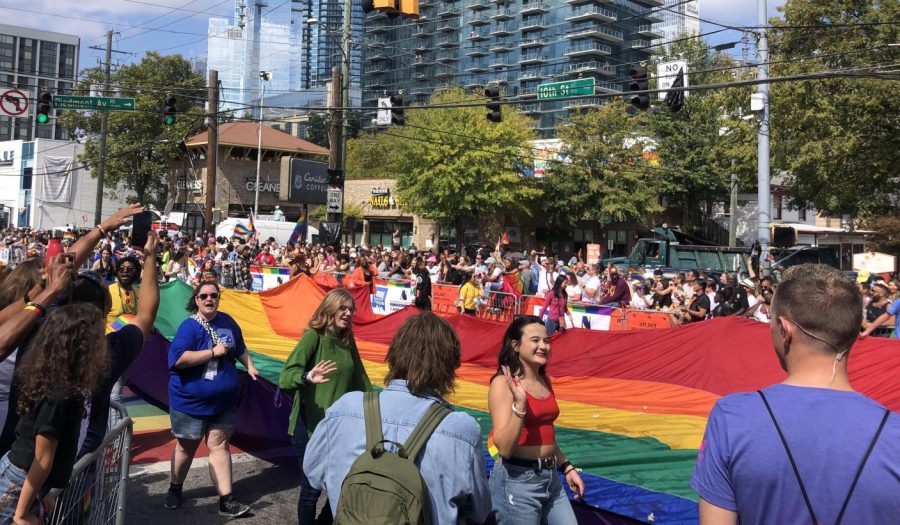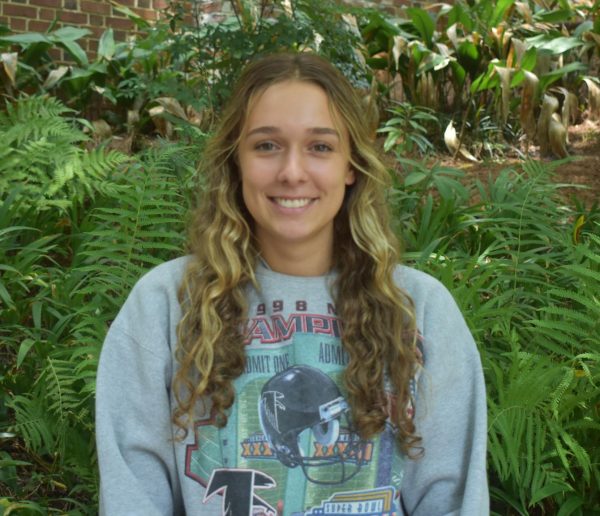Atlanta’s Pride Festival returns after two-year hiatus
October 24, 2022
The streets of Midtown filled with festival-goers, floats and Pride flags for the annual Atlanta Pride Festival over the weekend of Oct. 8-9.
Following two years of virtual celebrations, the Atlanta Pride Festival, hosted by the Atlanta Pride Committee (APC), returned for the first in-person festival since 2019. The event included the main Pride parade on Sunday, marches for individual LGBTQIA+ groups, activities in Piedmont Park and live music.
“It was just awesome,” junior Gyrffin Thomas said. “I felt like I was a part of something and we built this giant family. Through Pride, I found this community and they made me feel like it was okay to be myself and to feel like a person.”
For many people, this year was their first time attending Pride, due to the two-year break. This exposed them to unique experiences that they wouldn’t have had access to otherwise.
“The drag queen show was absolutely incredible and I want to go to another one now,” senior Halden Vale said. “It was unlike anything I’d ever been to before.”
The festival attracts over 300,000 people and is one of the largest Pride celebrations in the country. It serves as a symbol of the strong community many LGBTQIA+ people have found in Atlanta.
“It helps to know that you’re not alone in what you’re going through,” Thomas said. “It makes it easier to get through life, especially facing all the adversity that LGBTQ+ people face on a daily basis from everywhere.”
The APC had significantly more time to prepare for the festival this year, which extended the planning cycle. However, they still faced some of the same struggles as other festivals, due to the large number of people who attend the event.
“We had the unique perspective of having two years to get ready for the festival,” Steven Igarashi-Ball, Director of Equity and Engagement for the Atlanta Pride Committee, said. “Typically it’s a twelve month cycle. We just finished and are still finishing up from this year’s event, but we have already begun planning for next year.”
This year, Pride included many traditional events, like the 33rd annual Starlight Cabaret Show, but also introduced new aspects. The APC included three enclosed zones, throughout the festival, for people that may have sensory needs.
“We wanted to offer space for where they could duck out of the festival and take some self care,” Igarashi-Ball said. “We did that in conjunction with Compassionate Atlanta and Sojourn Atlanta, which are two of our community partners.”
Through initiatives like the sensory zones and other events hosted by the APC, they hope to create an inclusive and equitable community for everyone. Kristen Hart, Grady class of 2021 graduate, who attended the festival, believes this is vital for youth in Atlanta.
“I think people have heard the statistics about how at-risk LGBTQ+ youth are, so it’s really important for people to see that there is a possibility to live a wonderful and happy life in the community,” Hart said. “It’s just nice to surround yourself with people who feel the same as you and can relate to your experiences.”
The first Atlanta Pride festival happened in 1970, following the Stonewall and Lonesome Cowboy raids, and initially, was more of a political statement. Today, Pride includes more community and social events, however Igarashi-Ball believes it is important to remember the origins of the festival.
“There is a need for us to return to our roots and be political,” Igarashi-Ball said. “This year was the first time we had our two sitting representatives in the parade, as well as our candidate for governor from the Democratic party. I think it just reaffirms the need for Pride as a political statement.”
Atlanta has many elected officials that are openly LGBTQIA+, including Grady alumni and City Council member Matt Westmoreland. Additionally, many politicians are vocal supporters of the community.
“Our mayor, Andre Dickens, has said ‘Atlanta influences everything’ and I definitely believe in that statement,” Igarashi-Ball said. “Pride influences everything; we see our pride as a cohesive thread that unites our community.”
Atlanta’s established LGBTQIA+ community has helped create a supportive culture for young adults in Atlanta and Midtown. Many people believe this is important, especially for those who come from families and backgrounds that are less accepting.
“I grew up in a semi-conservative family and being gay or trans was never really talked about until I moved to Atlanta in 2015,” senior and president of GSA (Gender-Sexuality Alliance), Damon Morris, said.
GSA sponsor and AP Human Geography teacher, Christopher Wharton, shares his experience. Wharton grew up in rural Virginia, where it was much more difficult to be open about your identity, without facing discrimination and bullying.
“Representation matters so much,” Wharton said. “When you can see and meet the incredible huge number of people that are not only a part of the community but also support, it is very affirming and a reminder to people that they are not alone and there is a lot to celebrate as being a part of the [LGBTQIA+] community.”
At Midtown, the GSA provides a safe space for LGBTQIA+ students and allies, through club events and connections to resources in the community.
“It gives a place for students to have a fully supportive, inclusive community, that either identify as LGBTQIA+ or are allies,” Wharton said. “For a group of people that have often been marginalized, who are not always accepted by everyone in society, it’s important to have a place where they can come together and support each other and connect as part of the LGBTQIA+ family.”
GSA has its own Pride celebration planned for the end of October. They hope Pride and their own events will add to the accepting community created at Midtown.
“Pride definitely made me feel more welcomed into the community as someone who was barely finding themselves at that point and opened up a lot of doorways of community and identity,” Morris said.







